These are some of the considerations about waiting I presented as the keynote speaker recently at the ANTHROMOB international workshop on Mobility and the Future of Work.
Immobility and waiting have been often disregarded as irrelevant topics of study. In fact, waiting is often attached to those called left-behind, people who do not migrate but are part of families with migrant members. In particular women have often been perceived as “waiting penelopes” (Mata-Codesal 2016) from Homer’s Odyssey and the image of Penelope, who waits for her traveller Odysseus. The so-called Odysseus and Penelope syndromes are particularly illustrative of this: the former to name the feeling of displacement experienced by migrants, while the latter refers to the sense of abandonment experienced by migrants’ relatives. The impossible situation of waiting is sublimated and poeticized in this ancient epic, where love and faithfulness are able to overcome twenty years of separation. Penelope as the ‘left behind’ is commonly portrayed as passive, subordinated and lacking agency in their relatives’ mobility decisions. However, recent research questions the passive nature of the so-called left behind, and show the necessary roles they play in their relatives’ migratory projects and the development and maintenance of transnational social fields (Mata-Codesal 2015). People’s waiting for their relatives’ return may not just entail a passive inertial situation, in some cases we can even consider their waiting agential, active and intentional (Gray 2011), fulfilling essential tasks for the success of the migratory project.

